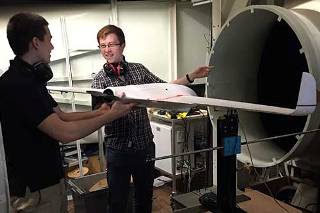Sep 15 2015
Engineering students from the University of Bristol are developing a unique unmanned airborne system (UAS) that will be used to monitor the activity of a live volcano in Latin America.
 Ignacio Soria Ramirez and Joshua Riches work on their unmanned airborne system. Image credit: Boeing
Ignacio Soria Ramirez and Joshua Riches work on their unmanned airborne system. Image credit: Boeing
As part of a Boeing-funded program at the University, the four engineering students will design the electric-powered UAS to collect atmospheric data and ash samples from the Fuego volcano in Guatemala during an expedition in February.
The aim of the students — Mohammad Rweished and Syed Taqi Haider from the Department of Electrical and Electronic Engineering and Ignacio Soria Ramirez and Joshua Riches from the Department of Aerospace Engineering — is to improve ash cloud modelling for aviation purposes by analysing the volcano’s activity.
Ignacio Soria Ramirez said: “The Boeing UAS project gives us the responsibility to design our own aircraft, which is a unique opportunity for undergraduates. The project poses challenges from both aerodynamic and electronic perspectives, requiring collaboration between different engineering disciplines. Learning to compromise within a team is invaluable experience for any career in engineering.”
Dr Tom Richardson, Senior Lecturer in Flight Dynamics and Control at the University and the project’s co-ordinator, added: “The initial focus of ash sample collection from the volcano’s plume is a highly challenging and technically demanding task ideally suited to small unmanned systems.”
A challenge is the requirement for the unmanned airborne system to be electrically powered, which demands an innovative approach to the design. The UAS will be able to maintain a flight time of about an hour, provide live video feed from up close to the volcano and collect ash samples from the volcano plume for later analysis by volcanologists.
“The scope and purpose of the project is not limited to volcano monitoring. Core technical challenges are being overcome to provide a platform that can be developed for different environmental monitoring purposes”, the students said.
Mohammad Rweished explained: “The Boeing project offers an opportunity to explore the application of unmanned airborne systems in new markets and in aiding in everyday tasks. The project poses high demands on reliable, safe communication links that can be used in other applications and industries. Maximising flight times using renewable and cleaner technology makes sustainability and efficiency core of the project.”
The University and Boeing envisage the project to be an annual activity that combines aspects of aerospace engineering, such as UAS design and control and operation in a controlled space, with aspects of electrical and electronic engineering, such as communications, observation and sensing. The project is consistent with both Bristol's and Boeing’s research interests in systems integration.
Sir Michael Arthur, President of Boeing UK and Ireland, said: “The University of Bristol engineering students have shown wonderful creativity and expertise in identifying a real-world problem and now developing a practical solution, in the form of this electric UAS.
“Boeing is proud to be able to support these accomplished students who will be the engineering leaders of the future — a future in which Boeing will have a great need for their talent.”